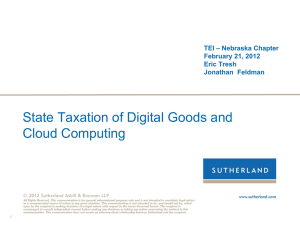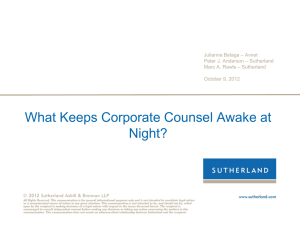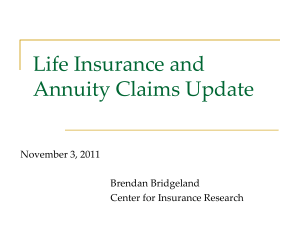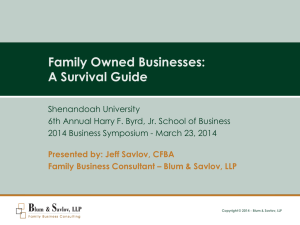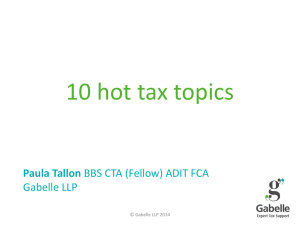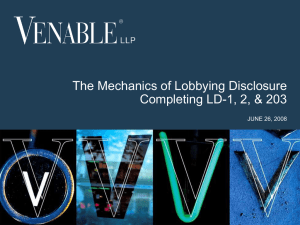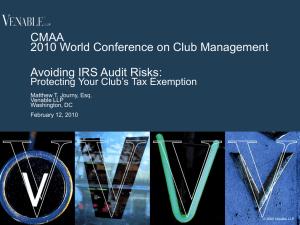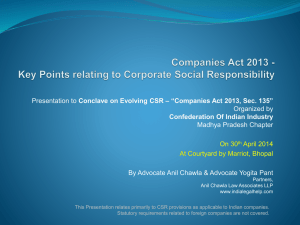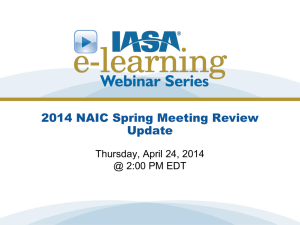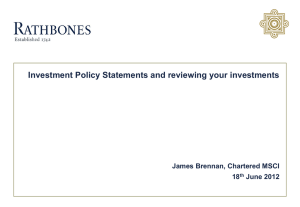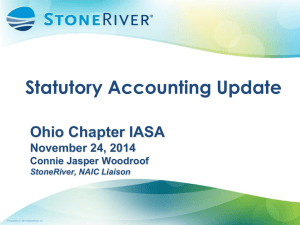Life Insurance Regulation and Unclaimed Property Audits
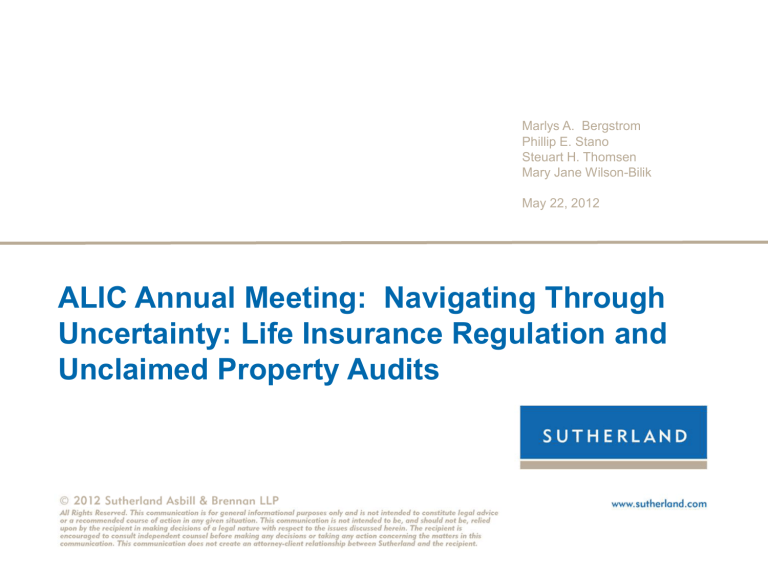
Marlys A. Bergstrom
Phillip E. Stano
Steuart H. Thomsen
Mary Jane Wilson-Bilik
May 22, 2012
ALIC Annual Meeting: Navigating Through
Uncertainty: Life Insurance Regulation and
Unclaimed Property Audits
Contributing Authors
Marlys A. Bergstrom
Attorney
404.853.8177
marlys.bergstrom@sutherland.com
Phillip E. Stano
Partner
202.383.0261
phillip.stano@sutherland.com
2
Steuart H. Thomsen
Partner
202.383.0166
steuart.thomsen@sutherland.com
Mary Jane Wilson-Bilik
Partner
202.383.0660
mj.wilson-bilik@sutherland.com
©2012 Sutherland Asbill & Brennan LLP
3
Overview
• Where are we now?
Audits, market conduct exams, settlements and AG subpoenas
Conflicting guidance: the New York 308 Letter vs. the Verus
Settlements
• Two worlds collide – Insurance law vs. unclaimed property law
• What to consider if you are under, or may be under, an unclaimed property audit, market conduct exam and/or AG subpoena on these issues
• Where are we headed?
State Treasurers/Comptrollers
NAIC/State Insurance Regulators
State Attorneys General
Litigation/Legislative (NCOIL)
• Questions?
©2012 Sutherland Asbill & Brennan LLP
4
WHERE ARE WE NOW?
©2012 Sutherland Asbill & Brennan LLP
5
Where Are We Now? A Timeline
• 2008: Verus starts unclaimed property audits of life insurers
• April 2011: First unclaimed property settlement announced
• May 2011: NAIC forms Executive Task Force to coordinate multistate exams of claim settlement practices
Florida and California conduct hearings
California DOI appoints Verus as market conduct examiner
• June 2011: New York AG subpoenas
• July 2011: New York 308 letters
• October 2011: First multi-state market conduct exam (FL lead)
MN administrative subpoena and MN DOC/AG unclaimed property letter
• November 2011: NY AG and Controller announce largest investigation of life insurance industry
CA Controller hires major law firm
©2012 Sutherland Asbill & Brennan LLP
6
Where Are We Now? A Timeline
• January 2012: Second unclaimed property settlement
• February 12, 2012: First multi-state market conduct exam settlement with 20 states
• February 14, 2012: MN DOC/AG issues follow-up letters
• February 2012: Massachusetts AG issues subpoenas
• February 2012: NCOIL does not approve model
• April 2012: Third unclaimed property/regulatory settlement agreement
• April 2012: Mayor Cuomo announces results of NY
308.
©2012 Sutherland Asbill & Brennan LLP
7
Where Are We Now?
• Verus Unclaimed Property Audits
Verus Financial LLC is comprised of plaintiff attorneys and financial services and life insurance professionals
More than 35 states have hired Verus to conduct unclaimed property audits
Approximately 25 life insurance companies are currently under audit
Since the inception of the audits, two settlements have occurred
Verus has been hired by 30+ states to conduct market conduct exams
©2012 Sutherland Asbill & Brennan LLP
8
Where Are We Now?
• Verus Unclaimed Property Audits
Nondisclosure agreements
Permits sharing of data with “other agencies”
Addition of states can be ongoing
Document and data requests
Processes and procedures for life, annuities and retained assets over the period 1996 - 2011
Unlike “standard” unclaimed property exams, requests are related to general processes, not just unclaimed property
Data requests encompass life, annuities and retained asset accounts
All policies, contracts and accounts in-force and out-of-force from
1996 -
2011 are reviewed on an “actual basis”
More than 100 data fields for each policy, contract or account
System programming frequently necessary to gather data
Dormancy trigger
Date of death
©2012 Sutherland Asbill & Brennan LLP
9
Where Are We Now?
• The Social Security Death Match – Verus Style
Run the entire data file against the Social Security Death
Master File (SSDMF)
Applying proprietary algorithm to determine “matches”
Actual matches and “fuzzy” matches on four categories
SSN, DOB, Last Name, First Name
Potential matches equal potential unclaimed property liability
Four-point exact match
Three-point exact plus fuzzy
Two-point exact plus two fuzzies
One-point plus three fuzzies
Four-point fuzzies
©2012 Sutherland Asbill & Brennan LLP
10
Where Are We Now?
• Unclaimed Property Audits – Verus Style
Dormancy trigger
– “date of death”
Limited time to search for the beneficiary
Risk of early escheatment
Threat of large interest payments
Use of “fuzzy matches”
©2012 Sutherland Asbill & Brennan LLP
11
Where Are We Now?
• NAIC Executive Task Force formed May 17, 2011
Florida Insurance Commissioner Kevin McCarty, current
NAIC President, announced NAIC Task Force called
“Investigations of Life/Annuity Claims Settlement Practice
(D) Task Force”
Purpose.
Coordinate targeted multi-state exams of life insurance companies on claims settlement practices
Membership.
Florida, California, Illinois, Iowa, Louisiana,
New Hampshire, New Jersey, North Dakota and
Pennsylvania
©2012 Sutherland Asbill & Brennan LLP
12
Where Are We Now?
• NAIC Executive Task Force formed May 17, 2011
Focus.
Initial focus is top 40 life insurance writers, comprising 92% of U.S. life insurance market
Potential liability. North of $1 billion
No guidance expected.
NAIC leadership has “no appetite” for guidance
Prefer to wait for the result of coordinated market conduct exams
Coordination with Verus
Work papers of unclaimed property audit become the work papers of the market conduct exams
©2012 Sutherland Asbill & Brennan LLP
13
Where Are We Now?
• Tallahassee, Florida, Hearing on May 19, 2011
Insurance Commissioner McCarty, the FL State Controller and the FL Attorney General conducted evidentiary hearing
Representatives of MetLife and Nationwide were subpoenaed to attend
Controversial positions of regulators:
Claim is matured on “knowledge” of death.
Even if a claim for a death benefit is not filed, a claim is matured on the insurer’s books and records for UP purposes, if a company “knows” the insured has died
“Asymmetrical” use of DMF is problematic.
Use of
DMF to stop annuity payments to deceased annuitants, but not identify life insurance deaths to pay benefits
©2012 Sutherland Asbill & Brennan LLP
14
Where Are We Now?
• Controversial positions of regulators:
Taking premium and fees (or lapsing a policy) after death is problematic. Focus on whether insurers “true-up” on paying claim
Dormancy period begins on date of death, not when insurer
“knows” of a death, receives a claim or “proof of death”
• Sacramento, California, Hearing on May 24, 2011
Similar to Tallahassee hearing
CA DOI appointed Verus as market conduct examiner
Examine 10 life insurers on:
Use of DMF
Practices for paying benefits under insurance policies and annuities, and
Payments to holders of retained asset accounts
©2012 Sutherland Asbill & Brennan LLP
15
Where Are We Now?
• New York Attorney General Subpoenas:
On June 21, 2011, the NY AG issued subpoenas to nine life insurers on their use of the DMF and their compliance with the NY unclaimed property laws
Two weeks to comply
Look-back to January 1, 2001, to present
All documents and communications on insurers’ policies and procedures for:
Determining when to cease making payments of benefits due to a death
Use of death record databases, like the DMF
Locating and notifying owners, insureds and beneficiaries of matured policies
©2012 Sutherland Asbill & Brennan LLP
16
Where Are We Now?
• New York Attorney General Subpoenas:
All documents and communications on insurers’ policies and procedures for:
Identification of policies without an address for any owner, insured, annuitant or beneficiary
Tracking and monitoring returned mail
Payment of death benefits
Allowing term policies to lapse
Wide range of documents on these topics, as well as unclaimed property filings and set asides/reserves to cover shortfalls in unclaimed property filings
Documents identifying senior and middle management
Documents on media coverage of shortfalls in unclaimed property payments in any state
©2012 Sutherland Asbill & Brennan LLP
Where Are We Now?
17
• New York 308 Letter
Following week, on July 5, NY DOI issued “308” Letter to
172 companies
Ordered life companies to cross-check all life insurance, annuity contracts and retained asset accounts on their administrative files against the DMF
Look-back 25 years to 1986
NYS issued four sets of guidance on use of DMF
Two-stage reports
First stage report.
Due October 31, 2011. Must complete the cross-check, categorize and report results electronically on spreadsheet using the Department’s portal
©2012 Sutherland Asbill & Brennan LLP
18
Where Are We Now?
• New York 308 Letter
Methodology required to do cross-match
If SSN : one-point check of SSN against DMF
Exact match only – no “fuzzy match”
If no SSN: match first and last name and date of birth against the DMF
Must verify the death
Second-stage progress updates on the last day of each month
From November 2011 through March 2012
Progress updates must be cumulative
Show matches eliminated because previously paid or not inforce at death, where locating beneficiary or still investigating
Very labor intensive
©2012 Sutherland Asbill & Brennan LLP
19
Where Are We Now?
• Proliferation of uncoordinated state market conduct exams, surveys, audits and subpoenas since May
2011
Inquiries from DOI in at least ten states, such as CT, CO,
IA, IL, KS, LA, MI, MA, MN and OH
Market conduct single state exams by at least nine states:
CA, FL, NE, ND, MA, MD, MN, NY and PA
FL and CA appointed Verus as market conduct examiner
Multi-state market conduct exams from seven states on
NAIC EX Task Force signed by FL, plus 23 others
Materials provided to Verus in unclaimed property audit are working papers in market conduct exam
©2012 Sutherland Asbill & Brennan LLP
20
Where Are We Now?
• Ongoing Escalation of Unclaimed Property Probes
On October 28, 2011, the MN AG and State Commissioner of
Commerce issued a letter requiring insurers to perform a comprehensive review of internal records and policies on unclaimed property
Certify compliance with unclaimed property laws by November
30
On October 31, 2011, MN DOC issued subpoenas – like NY AG – but going back 20 years
On November 4, 2011, the NY AG and Comptroller jointly vowed
“to undertake the largest and most comprehensive investigation of life insurance practices in the country”
To make sure life insurance companies “make good on their promises to beneficiaries and their obligations to the state of
New York”
In February 2012, MA AG issued subpoenas, even though MA is a
Verus state for unclaimed property and market conduct exam purposes
©2012 Sutherland Asbill & Brennan LLP
21
Where Are We Now?
• Class Actions
Four class actions filed in Ohio state court; all removed to federal court under CAFA
One state remanded to state court
• Plaintiffs’ Theory
Insurer duty to affirmatively determine whether any insured with greater than 70% (or 60%) chance of having died has in fact died and to pay benefits without proof of claim
Seek classes of all insureds for past 15 years with > 70% (or 60%) chance of death – including those who have died
Defenses including lack of legal support for alleged duty and absence of injury/standing for living plaintiff where no benefits are due
One motion to dismiss granted by state court on basis of these defenses; on appeal
One case voluntarily dismissed; motions pending in two cases
©2012 Sutherland Asbill & Brennan LLP
22
Where Are We Now?
• Illinois False Claim Act Lawsuits – Sealed Lawsuits
alleged insurers’ failure to transfer policy proceeds to state
Alleged 4,766 policies valued at $524.3 million
More than $1 billion counting alleged penalties
Whistleblower plaintiff receives 15%-30% of proceeds recovered
• New York Securities Derivative Suit
Asymmetrical use of DMF
Alleged breach of directors’ fiduciary duties to insurer
Alleged breach purportedly caused devaluing of stock; increased regulatory exposure to insurer
©2012 Sutherland Asbill & Brennan LLP
23
Where Are We Now?
• Regulation by Settlement
Industry standards developed from company-specific settlements
Huge regulatory fees; no clear authority
Inherent uncertainty after settlement
No finality
©2012 Sutherland Asbill & Brennan LLP
24
Where Are We Now?
• Settlements: Unclaimed Property and MCE
Date of death is dormancy trigger on unclaimed property audit settlements (no basis in law)
Possible conflicts of law issues on “ beneficiary presumption ”
“Settlement” is a misnomer : Verus will present “fuzzy matches” to insurer at a rate of 10,000 or more per month for a year or so, for validation or proof that match is invalid, which must be provided to
Verus within 30 days
ERISA annuity contracts are carved out of UP settlement, but not market conduct settlement
Insurer agrees to conduct quarterly searches of DMF using unproven “fuzzy match” algorithm to obtain “notice” of death
Once insurer receives “notice” of valid death, must conduct a
“thorough search” for beneficiaries – or escheat
Market Conduct Exam Settlement continues for an additional 8 years, with payments to Verus and the states for administering the exam throughout that period.
©2012 Sutherland Asbill & Brennan LLP
25
TWO WORLDS COLLIDE –
INSURANCE LAW VS. UNCLAIMED PROPERTY LAW
©2012 Sutherland Asbill & Brennan LLP
26
Two Worlds Collide – Insurance Law vs.
Unclaimed Property Law
• Conflicting demands and tensions resulting from different approaches of
Insurance regulation and traditional insurance practices
Unclaimed property law and positions staked out by auditors and unclaimed property administrators
• Conflicting objectives of regulatory schemes
Insurance regulation – insurer solvency and protection of insureds and beneficiaries
Unclaimed property – earliest possible escheatment of funds to state
©2012 Sutherland Asbill & Brennan LLP
27
Two Worlds Collide – Insurance Law vs.
Unclaimed Property Law
• Insurance regulation
Unfair Claims Practices Act
What constitutes a claim
• Unclaimed property laws
General concept – if property is unclaimed for full dormancy period, report it and escheat it to state
Outside of insurance, generally based on loss of contact with property owner
Different dormancy period triggers for insurance
Typically when (i) proceeds became due and payable or
(ii) insured reaches or would have reached limiting age
Some states have knowledge of death trigger
©2012 Sutherland Asbill & Brennan LLP
28
Two Worlds Collide – Insurance Law vs.
Unclaimed Property Law
• Proof of death vs. knowledge of death
What constitutes knowledge of death
What constitutes a claim
What triggers statutory interest
©2012 Sutherland Asbill & Brennan LLP
29
Two Worlds Collide – Insurance Law vs.
Unclaimed Property Law
• Time limits
Insurance – often no time limit for submission of death benefit claim
Unclaimed property
In some states, escheatment is required at the end of a dormancy period triggered by knowledge of death, without regard to submission of any claim for benefits
Verus contends that the dormancy period is triggered by date of death, without regard to any claim for benefits or even any knowledge of death
©2012 Sutherland Asbill & Brennan LLP
30
Two Worlds Collide – Insurance Law vs.
Unclaimed Property Law
• Impact of knowledge of death
In less than half of states, knowledge of death an express dormancy trigger
In more than half of states, not an express dormancy trigger
Arguably no dormancy period triggered until limiting age reached if merely knowledge of death without proof of death and no claim
Not necessarily a good position for insurers to be in
Consider impact in states where statutory interest runs from date of death
What position will insurance regulators take?
©2012 Sutherland Asbill & Brennan LLP
31
Two Worlds Collide – Insurance Law vs.
Unclaimed Property Law
• Date of death as dormancy trigger
Verus position, citing Connecticut Mutual v.
Moore , apparently for all states
Not supported by Moore
Not supported by language of most statutes
Implies duty to search affirmatively for deaths to avoid unclaimed property penalties
Duty – Insurance regulators may attempt to impose and/or adopt new statutes
©2012 Sutherland Asbill & Brennan LLP
32
Two Worlds Collide – Insurance Law vs.
Unclaimed Property Law
• Duty to maintain contact with insureds and beneficiaries
Insurance law generally does not appear to impose duties to seek out new addresses (although referenced in NAIC Market Conduct Examination
Handbook)
Relevance of loss of contact under unclaimed property laws
Relevant to limiting age triggers
Some duties imposed by 1981 Act
Loss of contact after submission of a claim
©2012 Sutherland Asbill & Brennan LLP
33
Two Worlds Collide – Insurance Law vs.
Unclaimed Property Law
• Time period to verify deaths and attempt to pay claims
Where claim submitted, Unfair Claims Practices statutes typically set time frames
Verus audit process seeks to impose short period to verify deaths and determine whether policy proceeds may be due and owing
Insurance regulators may attempt to impose new requirements and/or sponsor new statutes
©2012 Sutherland Asbill & Brennan LLP
34
Two Worlds Collide – Insurance Law vs.
Unclaimed Property Law
• Protection against liability for early and/or improper escheatment
Unclaimed property administrators and auditors are urging procedures that may involve escheating early or to the wrong state
Not clear whether liability relief provisions in unclaimed property statutes apply in such circumstances
Insurance regulators should be concerned about exposure to insurers possibly created by questionable escheatment procedures
Unclaimed property administrators and auditors not taking into account federal securities laws
©2012 Sutherland Asbill & Brennan LLP
35
Two Worlds Collide – Insurance Law vs.
Unclaimed Property Law
• Insurance regulators’ lack of authority
• Contractual obligations
• Unfair Claims Practices Act
• Market regulation handbook
• New York
• Historical perspective
©2012 Sutherland Asbill & Brennan LLP
36
POINTERS TO KEEP IN MIND:
UNCLAIMED PROPERTY AND
MARKET CONDUCT EXAMS
©2012 Sutherland Asbill & Brennan LLP
37
Unclaimed Property Exams
• How unclaimed property exams differ from state market conduct exams
No statute of limitations
Utilizing third-party contingent fee auditors
Aggressive definitions of unclaimed property types
Burden of proof is immediately shifted to the company
Very few administrative remedies
• Preparing for the unclaimed property exam
Be proactive – determine your potential liability
Consider running DMF using “fuzzy matches”
Voluntary Disclosure Agreements
Process and procedure review
©2012 Sutherland Asbill & Brennan LLP
Market Conduct Exam Considerations
38
• Exams will focus on policies and procedures for and results of
Claims process
Missing policyholders
Limiting age and maturity dates
• Steps to consider
Form your team (compliance, legal, unclaimed property) to do internal compliance review under attorney-client privilege
Know whether you have used the DMF in your business and evaluate your processes for paying death benefits
Evaluate how you identify and locate beneficiaries
Evaluate what you do to find missing policyholders, see if insured on lapsed policy died, determine if the missing person is deceased, treat maturity date
Examine your processes around escheatment
©2012 Sutherland Asbill & Brennan LLP
Market Conduct Exam Considerations
39
• Confidentiality of market conduct exam papers
In 2004, the NAIC adopted Model 693, which has been adopted or is consistent with a majority of state laws
Strong confidentiality protections in the Model.
Section
7.A. of Model 693 requires that “all documents, including but not limited to working papers” be kept confidential
But confidentiality provisions of Model 693 are not uniformly adopted. Not all state laws treat market conduct materials as confidential or prohibit states from disclosing those market conduct materials
Some states make disclosure of market conduct materials permissible at the discretion of the commissioner
Get legal advice because litigation may be a real possibility
©2012 Sutherland Asbill & Brennan LLP
40
WHERE ARE WE HEADED?
©2012 Sutherland Asbill & Brennan LLP
41
Where Are We Headed?
• State Comptrollers and Treasurers
Reducing budget deficits
Unclaimed property is a proven revenue raiser
States are holding more than $6 billion in unclaimed property
Companies remit hundreds of millions a year
States return only a fraction of the amount collected
States benefit from poorly documented beneficiary information
Third-party unclaimed property audits are a win-win for the state
©2012 Sutherland Asbill & Brennan LLP
42
Where Are We Headed?
• Unclaimed Property Administrators
Continue to utilize unclaimed property as a revenue generator
Creative theories of what is unclaimed property
Changes in state laws regarding dormancy trigger
Uniformity?
Lack of knowledge of insurance law
Willingness to enter into voluntary disclosure agreements
Improved procedures for returning escheated property to beneficiaries
©2012 Sutherland Asbill & Brennan LLP
43
Where Are We Headed?
• NAIC/State Insurance Regulators
Likely require a DMF match at regular intervals across the business
Require investigation of matches under the Unfair Claims Practices statutes
What level of “match” will be required?
Single point match of SSN like New York 308 guidance?
“Fuzzy matches” under the Verus algorithm?
Model Law and/or 50 state variations?
What level of proof of death will be required to pay and/or escheat a “claim” and trigger “interest” on death proceeds?
Model Law and/or 50 state variations?
Existing contract language?
Variable contracts?
What types of duties will be imposed?
©2012 Sutherland Asbill & Brennan LLP
44
Where Are We Headed?
• NAIC/State Insurance Regulators
Multi-state exams are likely
Multi-state MCE for top 40 life insurers
Coordinate with multi-state unclaimed property audit so data from audit becomes market conduct work papers
Prepare
Remediate
Legal defenses
©2012 Sutherland Asbill & Brennan LLP
45
Where Are We Headed?
• Potential Challenges with Unclaimed Property/Market
Conduct Exams/Settlements
Lack of authority
Violates existing authority
Conflict of interest
Confidentiality of records
Examiner qualifications
Insurer privileges
Sampling
Credible match criteria
©2012 Sutherland Asbill & Brennan LLP
46
Where Are We Headed?
• State Attorneys General
More subpoenas or inquiries possible
Unclear whether AGs are coordinating with each other or with
Unclaimed property administrators
Insurance regulators
Can be very onerous in scope
©2012 Sutherland Asbill & Brennan LLP
47
Where Are We Headed?
• Possible Further State False Claims Act Litigation
Cited in Minnesota Attorney General Letter
32 states and DC have False Claims Acts
Six apply only to Medicaid
Most modeled after federal statute
Most have qui tam provisions
Most apply to reverse false claims
©2012 Sutherland Asbill & Brennan LLP
48
Where Are We Headed?
• Unclaimed Property Claims Litigation – Beyond Ohio
Duty to search
Beneficiary as plaintiff
Negligent escheatment
Consequential damages
Improper calculations of benefits
©2012 Sutherland Asbill & Brennan LLP
49
Where Are We Headed?
• NCOIL Legislation
Will an alternative to the Verus Settlement emerge?
Current draft legislation uses 308 Model and may be opposed by the Verus states
©2012 Sutherland Asbill & Brennan LLP
50
Where Are We Headed?
• Considerations
Review policies and procedures
Consider VDAs
Conduct remediation in advance of audit
Fuzzy matches – test credibility; determine exposure
©2012 Sutherland Asbill & Brennan LLP
